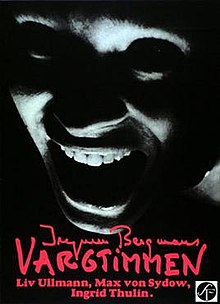
Back ساعة الذئب Arabic ساعه الذئب ARZ Часът на вълка Bulgarian Vargtimmen Catalan Hodina vlků Czech Vargtimmen Welsh Die Stunde des Wolfs German La hora del lobo Spanish Vargtimmen Basque ساعت گرگ و میش Persian
| Hour of the Wolf | |
|---|---|
 Theatrical release poster | |
| Directed by | Ingmar Bergman |
| Written by | Ingmar Bergman |
| Produced by | Lars-Owe Carlberg |
| Starring | |
| Cinematography | Sven Nykvist |
| Edited by | Ulla Ryghe |
| Music by | Lars Johan Werle |
Production company | |
| Distributed by | Svensk Filmindustri |
Release date |
|
Running time | 88 minutes[1] |
| Country | Sweden |
| Language | Swedish |
| Box office | $250,000 (U.S.)[2] |
Hour of the Wolf (Swedish: Vargtimmen, lit. 'The Wolf Hour') is a 1968 Swedish psychological horror[n 1] film directed by Ingmar Bergman and starring Max von Sydow and Liv Ullmann. The story explores the disappearance of fictional painter Johan Borg (von Sydow), who lived on an island with his wife Alma (Ullmann) while plagued with frightening visions and insomnia.
Bergman originally conceived much of the story as part of an unproduced screenplay, The Cannibals, which he abandoned to make the 1966 film Persona. He took inspiration from Wolfgang Amadeus Mozart's 1791 opera The Magic Flute and E. T. A. Hoffmann's 1814 novella The Golden Pot, as well as some of his own nightmares. Principal photography took place at Hovs Hallar, Stockholm and Fårö.
Themes include insanity, particularly as experienced by an artist, sexuality, and relationships, conveyed in a surreal style and with elements of folklore. Analysts have found allusions to vampire and werewolf legend. Authors have also connected the work to Bergman's life and his relationship with Ullmann; Bergman said he was experiencing his own "hour of the wolf" when he conceived the story.
The film was initially met with negative reviews in Sweden. In later years Hour of the Wolf received generally positive reviews and was ranked one of the 50 greatest films ever made in a 2012 directors' poll by the British Film Institute. The film was followed by Bergman's thematically related films Shame (1968) and The Passion of Anna (1969). Ullmann won awards in 1968 for her performances in both Hour of the Wolf and Shame.
- ^ Shargel 2007, p. xlii.
- ^ Balio 1987, p. 231.
- ^ Gervais 1999, p. 104.
- ^ Sinnerbrink 2011, p. 167.
- ^ Smith 2018, p. 169.
- ^ a b "Genre". Turner Classic Movies. Archived from the original on 14 January 2019. Retrieved 14 January 2019.
- ^ Cite error: The named reference
newmanempire15was invoked but never defined (see the help page). - ^ Cite error: The named reference
Teodorowas invoked but never defined (see the help page). - ^ Brody, Richard (12 February 2018). "Film Forum Celebrates Ingmar Bergman's Centenary". The New Yorker. Archived from the original on 27 July 2018. Retrieved 14 January 2019.
- ^ Ellinger, Kat (30 January 2018). "Ingmar Bergman, folk horror pioneer". British Film Institute. Archived from the original on 30 December 2018. Retrieved 17 January 2019.
Cite error: There are <ref group=n> tags on this page, but the references will not show without a {{reflist|group=n}} template (see the help page).